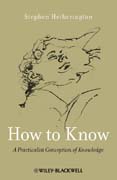
Some key aspects of contemporary epistemology deserve to be challenged, and How to Know does just that. This book argues that several long-standing presumptions at the heart of the standard analytic conception of knowledge are false,and defends an alternative, a practicalist conception of knowledge. Presents a philosophically original conception of knowledge, at odds with some central tenets of analytic epistemology Offers a dissolution of epistemologys infamousGettier problem explaining why the supposed problem was never really a problem in the first place. Defends an unorthodox conception of the relationship between knowledge-that and knowledge-how, understanding knowledge-that as a kind of knowledge-how. INDICE: Preface and Acknowledgements. 1 The Standard Analytic Conception of Knowledge. 1.1 Knowing is a Belief State (or Something Similar). 1.2 Knowledge is Well Supported. 1.3 Knowledge is Absolute. 1.4 Knowing Includes not being Gettiered. 1.5 Knowledge-that is Fundamentally Theoretical, not Knowledge-how. 1.6 The Standard Analytic Conception of Knowledge. 1.7 Prima Facie Core Problems. 1.7.1 The justificationism problem. 1.7.2 The Gettierism problem. 1.7.3The theoreticalism problem. 2 Knowledge-that as Knowledge-how. 2.1 The RyleanDistinction. 2.2 The Rylean Argument. 2.3 Wittgenstein on Rule-following. 2.4The Knowledge-as-Ability Hypothesis. 2.5 Justification. 2.6 Grades of Knowledge. 2.7 Denying Knowledge-Absolutism: Clear Precedents. 2.7.1 Augustus de Morgan. 2.7.2 Rudolf Carnap. 2.7.3 Norman Malcolm. 2.7.4 W. V. O. Quine. 2.7.5 Jaakko Hintikka. 2.7.6 David Lewis. 2.7.7 Alvin Goldman. 2.7.8 Christopher Peacocke. 2.7.9 Ernest Sosa. 2.7.10 Baron Reed. 2.8 Denying Knowledge-Absolutism: Possibly only Apparent Precedents. 2.8.1 Locke. 2.8.2 Russell. 2.8.3 Contextualism. 2.9 Sceptical Challenges. 2.10 Sceptical Limitations. 2.11 Epistemic Agents. 2.12 Abilities. 2.13 Rylean Mistakes. 2.14 Conclusion. 3 Gettier? No Problem. 3.1 Gettier Situations. 3.2 A Counter-Example to Gettiers Official Result. 3.3 Ordinary Gettiered Knowledge. 3.4 A Meta-Gettier Problem. 3.5 Objections Answered. 3.6 Gettier-Luck as Veritic Luck? 3.7 Gettier-Luck is not Veritic Luck. 3.8 Gettier-Luck is Combinatorial Luck. 3.9 Combinatorial Luck: Applications. 3.10 Knowing in a Combinatorially Lucky Way. 3.11 Gettier-Holism Versus Gettier-Partialism. 3.12 Combinatorial Safety. 3.13 Combinatorial Gradational Safety. 3.14 Epistemological Privilege and Epistemological Empathy. 3.15 Gettier Situations and Sceptical Situations. 3.16 Timothy Williamson. 4 Is this a World where Knowledge has to Include Justification? 4.1 Justificationism, Broadly Understood. 4.2 The Causally Stable World (CSW) Thesis. 4.3 Knowledge Within Causally Fluky Worlds. 4.4 Knowledge as Putatively Pervasive. 4.5 Non-tetheringJustification. 4.6 Linguistic Intuitions. 4.7 Kinds of Intension. 4.8 Conditional Justificationism. 4.9 Knowledge Within Different Possible Worlds. 4.10 Wholly General Justificationism. 4.11 A Thin or Minimal Concept of Justificationism. 4.12 Knowledge Within Causally Semi-fluky Worlds. 4.13 Evidence and Counter-Evidence. 4.14 Timothy Williamson. 5 Knowledge-that as How-Knowledge. 5.1 Knowing How it is that p. 5.2 How-Knowledge that p and Gradualism. 5.3 Degrees of Knowledge and Degrees of Belief. 5.4 How-Knowledge that p and Truthmakers. 5.5 Knowledge that p and Gradualism. 5.6 Knowledge-Gradualisms Central Concept. 5.7 Can there be Minimal Knowledge? 5.8 Minimal Knowledge as Foundational Knowledge. 5.9 Knowledge-Gradualism: Closure
- ISBN: 978-0-470-65812-3
- Editorial: John Wiley & Sons
- Encuadernacion: Cartoné
- Páginas: 272
- Fecha Publicación: 08/04/2011
- Nº Volúmenes: 1
- Idioma: Inglés
